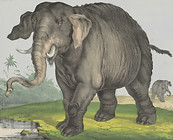Liberty Hyde Bailey and a Bite of the Apple from the Garden of Darwin

A century ago Liberty Hyde Bailey, chair of the Department of Forestry at Cornell University, originator of Nature Study, and respected horticulturalist, acknowledged the natural responsibility of humans to husband the good earth. He reminded everyone that the earth created us. He famously argued, “One does not act rightly toward one’s fellows if one does not know how to act rightly toward the earth.” From Bailey’s perspective, caring for the earth was prerequisite to acting morally. He eloquently reconciled evolution and religious morality through belief in the inherent goodness of creation. Humans bore moral responsibility as a result of having the power of forethought guided by the knowledge of good and evil. Bailey’s perspective, for me, remains a compelling way of reconciling religion and science in the context of thinking about humans as moral agents.
The created earth lies above and before man, and that therefore it is not man’s but God's. Man finds himself upon it, with many other creatures, all parts in some system which, since it is beyond man and superior to him, is divine. He operates consciously and increasingly with plan aforethought; and therefore he carries heavy responsibility.
The goodness of the planet is the basic fact in our existence. The earth is good in itself, and its products are good in themselves. The earth sustains all things. It satisfies. . . . It matters not whether this satisfaction is the result of adaptation in the process of evolution; the fact remains that the creation is good.
Acting rightly toward the earth cannot happen without grasping the evolutionary nature of living systems. Eons of wisdom lie distributed throughout the genomes of earth’s living populations, Darwin’s garden of earthly delights. For this reason, appreciation of evolution is essential to discharging moral responsibilities. Darwin’s view of life cuts across sciences, religions, cultures, arts, and humanities in posing the questions, “What makes us human? How did we become so? How might we be more so?” Responsibility, a natural consequence of our evolutionary journey, is central to the answer.
As the eloquent voice of Carl Safina, puts it, “The most appropriate response to the world is to realize, with awe, the ferocious mystery of being alive in it. And act accordingly.”
Darwinian histories are but one piece in this “ferocious mystery.” They place humanity squarely within the natural world, fostering deep respect for the present moment, an awareness incumbent upon those whose natural responsibility is to midwife the future. It is good and right to do so not only because the natural world—felt divine by many—made us but also because our actions alter habitats and rearrange genomes. Imagery is called for that will unite the natural with our institutions of commerce, science, and governance, imagery that accepts culture and nature in a common embrace, imagery that returns to the proposition that people are good, imagery that subsumes evolutionary theory with ecological thinking, imagery that endorses the belief that life is good.
The Darwinian sense of evolution directly informs society’s most important collective actions. These collective actions manipulate habitats on global (e.g., atmospheric warming) and local (e.g., wetlands destruction) scales. Human need transforms forested landscapes to agricultural ones. Human commerce both by intent and accident transports species from their native to non-native habitats with unanticipated consequences. Competition between humans and other species for space, food, water, and minerals drives creatures to extinction. The introduction of domesticated plants and animals into the ecosystems of the world modifies the conditions of life. Clearly, to understand Darwin is to acknowledge that human activity is essential to the workings of natural selection. Responsibility is humanity’s natural condition; our “natural responsibility” is Darwin’s apple, and we should not hesitate to take a bite.
As a consequence of being the arbiters of habitat and the engineers of genomes, humans have assumed an enormous responsibility. Human action holds hostage the course of evolution. Ignorance of the consequences of evolutionary ideas for conserving biodiversity and sustaining human societies most certainly promises a degraded and disfigured world. Wide-eyed acceptance of responsibility, as the natural consequence of being human, is a burden we must carry successfully if we are to bequeath a robust and productive earth to future generations.
Some may believe that the Genesis story of the apple (or pear or pomegranate—the actual fruit cannot really matter, it’s the imagery that counts) may simply mean to fear serpents and obey God. Knowledge of good and evil first turned Adam and Eve to wearing fig leaves. The story speaks metaphorically about temptation and humanity’s fall from an initial, natural state of grace. If a bite of the apple means acquiring knowledge good and evil, then a taste for such things has consequences—assuming moral responsibility among them.
A bite from Darwin's apple promises the sweet deliciousness of insight into life's diversity within unity and realization of the consequence of being a human animal in the garden: inescapable responsibility.
------------------------------
Liberty Hyde Bailey, The Holy Earth (New York: Charles Scribner’s Sons, 1916/2010) 4-6. Project Gutenberg. Accessed March 9, 2013, at http://www.gutenberg.org/ebooks/33178.
Carl Safina, The View from Lazy Point (New York: Henry Holt and Company, LLC, 2011), 356.












